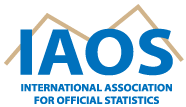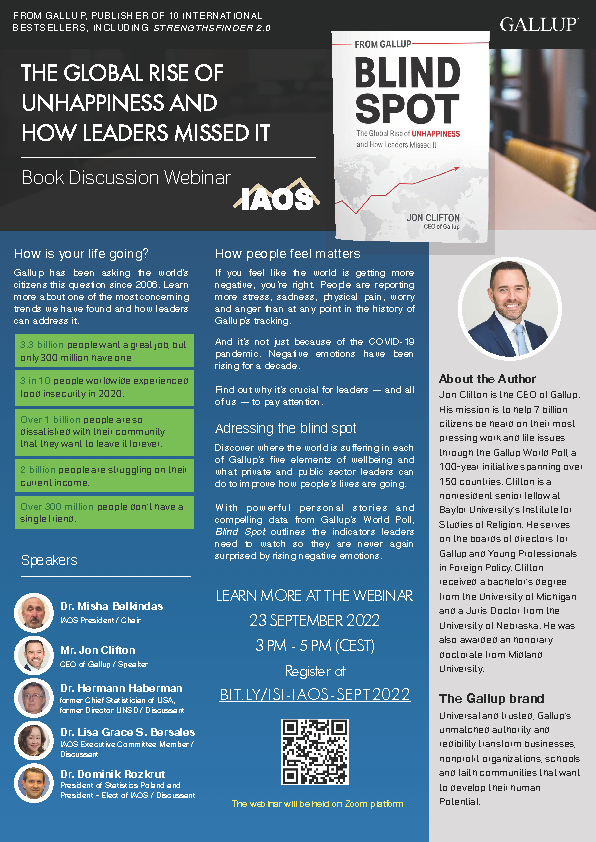- Webinars
Fundamental Principles of Official Statistics: 30 Years after Its Development” IAOS - ECLAC Webinar - 3 November 2022
Official statistics are based on a set of principles that ensure that they are impartial, relevant, and accurate and can be relied upon as a public good by all users. The Fundamental Principles of Official Statistics (FPOS) are structured as 10 main issues that cover all the processes of the production and dissemination of statistics: Relevance, Impartiality, and Equal Access; Professional Standards and Ethics; Accountability and Transparency; Prevention of Misuse; Sources of Official Statistics; Confidentiality; Legislation; National Coordination, and Use of International Standards.
The Fundamental Principles of Official Statistics were first developed and adopted at the United Nations Economic Commission for Europe (UNECE) 30 years ago and later endorsed by the General Assembly as a global standard. This 30th Anniversary provides an opportunity to discuss the past, present, and future of the Principles and their relevance in the context of a rapidly changing data landscape.
This webinar was organized by the IAOS and the Statistics Division of the Economic Commission for Latin America and the Caribbean (ECLAC) on November 3, 2022, as an activity of the Knowledg Transfer Network (KTN) of the Statistical Conference of the Americas (SCA). The IAOS promotes the understanding and advancement of official statistics and related subjects and fosters the development of effective and efficient official statistical services through international contacts among individuals and organizations, including users of official statistics as well as research institutes. The IAOS has taken an active role in supporting the active implementation of the FPOS. ECLAC Statistics Division contributes to improving the production, dissemination and use of statistics for evidence-based decision-making in the region, through training courses, seminars and other capacity building activities, regional data harmonization and dissemination, and supporting the SCA as its technical secretariat. The KTN contributes to the dissemination of knowledge and cooperation in statistics offering access to documents, seminars and methodological materials prepared by the working groups of the SCA and the regional statistical community. Since 2019, the National Statistical Institute (INE in Spanish) of Chile coordinates the organization of virtual seminars.
Webinar Programme
- Moderator: Rolando Ocampo, Director of ECLAC Statistics Division
- Sandra Quijada, Director, INE Chile – Welcome words
- Misha Belkindas, President, IAOS – Overview of the FPOS and their relevance for the users of statistics
- Eduardo Sojo, Former President, INEGI Mexico – Putting the FPOS into practice: the experience of INEGI
- Lisa Bersales, Professor of Statistics, University of the Philippines School of Statistics, and IAOS Executive Committee member – The FPOS 30 years after: challenges in a changing context
Read the presentations from the webinar below:
Watch the video recording of the webinar here
UN World Data Forum 2023: Session "Challenges to Data Privacy and Misuse" - 26 April 2023
Organizers: International Association for Official Statistics and Krakow Working Group; Statistics Poland; Full Fact
Background:
Data and statistics have long been used to inform decisions. But with the development of Internet and new IT technologies, the last two decades have seen a rapid multiplication and generalization of data uses. Data have now become an essential input in the daily lives and operations of governments, institutions, businesses and individuals. The speed at which this is occurring poses an unprecedented challenge to our societies as it disturbs and short-circuits the well-established processes for validating the quality and legitimacy of the knowledge used to produce evidence for decision-making, and for taking the necessary regulations that ensure its trustworthiness in full respect of human rights and democratic principles. Official Statistics are directly affected by this “data revolution”. To fulfill their fundamental mission of informing the general public about social, economic and environmental developments, and assist in the development and evaluation of public policies, Official Statistics must avail of multiple data sources while ensuring quality and preventing misuse. Doing so however requires innovation, engagement with other actors and compliance with strict ethical rules both as regards methodological processes and adherence to democratic principles. In addition to statistical information personal data protection and privacy constitute a real challenge. In Africa for example, not all the countries have data protection laws which put the personal privacy at risk of abuse. So, the lack of legal framework led to complete absence of the protection and safeguards. It is observed that breach of the right to privacy and data protection is occurring even in countries that adopted data protection laws. National security and public interest are “Legal exemptions” that suspend the application of data protection laws and consider as the legal tool used by authorities to breach the right to privacy even if access to that personal information is not necessary. To expose the issues of data misuse the IAOS has created the “Krakow Working Group” whose aim is to contribute to the collective reflection on the challenges that our “datafied” societies pose to Official Statistics and beyond.
Speakers:
- Misha Belkindas (Moderator) – IAOS, President
- Dominik Rozkrut (Panelist) – Statistics Poland, President
- Kate Wilkinson (Panelist) – Full Fact,Senior Product Manager
- Martine Durand (Panelist) – France Statistical Authority, Member
- Jan Robert Suesser (Panelist) – IAOS, Co-Chair of the Krakow Working Group devoted to “Challenges our Datafied Societies Pose to Official Statistics”
Watch the video recording of the session: UNWDF 2023 Session “Challenges to Data Privacy and Misuse”
UN Statistical Commission 2023: Side Event "Interference in Work of Official Statistics: How Fundamental Principles of Official Statistics are Helping” - 27 February 2023

Organizer: International Association for Official Statistics (IAOS)
The spurs for the creation of the Fundamental Principles of Official Statistics (FPOS) adopted by the UNECE in 1992, and by the UNSC in 1994, were political and economic changes caused by the fall of socialist systems in Europe and in other regions of the world in 1989- 1992. In the 1990th the FPOS were used, in many countries, as the basis of the adoption of statistical laws and to restructure and provide acceptance for national statistical offices in transition countries into the global statistical community. It soon became clear that the Principles are of universal importance for all stakeholders of statistics, for all countries as well as international organizations involved in production, distribution and use of official statistical data. From the adoption of the Principles by the UNSC in 1994 to the adoption by the ECOSOC in 2014 twenty years went by. During those years the FPOS served well the statistical community, Governments, and the population at large.
However, there are numerous cases when national statistical offices (NSOs) and chief statisticians are attacked by policy makers and media for doing their job. ISI and IAOS are usually issuing statements to alert Governments and the larger community of the FPOS violations. The experience of the last couple years shows that the situation is not getting better. With many new data sources and a changing role of NSOs the situation may become worse.
The panel of the in-person side event at the UNSC 54th Session, composed of four chief statisticians, discussed the usefulness of the FPOS.
A few quotes from the panelists:
“Interference in the work of any statistical office is an alarming situation because they are not simple information sources, but key elements for local, national, and global governance. This idea was explicitly acknowledged in the General Assembly Resolution 68/261 endorsing the Fundamental Principles of Official Statistics. Thus, it is crucial to keep in mind the systemic consequences that any interference have in the larger global community. At the same time, the FPOS are also a powerful instrument to promote citizen’s rights.”
“The well-known aim of fundamental principles is to guide NSOs to adhere to certain professional and scientific standards, while other use them as a shield to protect official statistics from “threats”. However, more and more official producers use FPOS as a “tool box” that is open and flexible as well as enabler rather than a constrainer. Whatever we do as chief statisticians’ maps to FPOS toolbox that ensures consistency, harmony, quality and standards. The FPOS toolbox enable us to advocate for a technical cooperation, explore data sources, reduce interference, choose right methods and most importantly communicate with each other in same language.”
The panel was chaired by Dr. Misha Belkindas, IAOS President, and included:
- Dr. Graciela Marques – President, National Institute of Statistics and Geography (INEGI), Mexico
- Dr. Ola Awad – President, Palestinian Central Bureau of Statistics (PCBS)
- Dr. Jūratė Petrauskienė – Director General, Statistics Lithuania
- Dr. Dominik Rozkrut – President, Statistics Poland
UN Statistical Commission 2023: Side Event "History of creation of FPOS, relevance today, missions for tomorrow - a message from the creators" - 2 February 2023

This side event hosted by the IAOS at the UNSC 54th Session on February 2, 2023 aimed (a) to explore practical conclusions derived from the history of the Fundamental Principles of Official Statistics (FPOS), based on 30 years of experiences by different groups of stakeholders of official statistics, with special reference to statistical agencies and other producers of official statistics and to the governments and international organizations and (b) to discuss the mission of the FPOS in XXI century – legal, methodological and ethical basis of protecting “clean” information for societies in knowledge-based economies amid conditions of globalization.
Speakers:
- Dr. Misha Belkindas (chair): President, IAOS; Managing Director, ODW Consulting; co-founder and board member of Open Data Watch; former Manager, World Bank’s Development Data Group
- Dr. Jean-Louis Bodin: Former IAOS and ISI President
- Dr. Jozef Olenski: Center of Transborder Studies and Euroregional Statistics, Statistical Office in Rzeszów, Poland; former President Statistics Poland; former Professor, Lazarski University
- Dr. Hermann Habermann: Former Chief Statistician of USA; former Director UNSD
Read the presentations from the side event below:
- Dr. Jean-Louis Bodin: History of the FPOS and Relevance today, Missions for tomorrow
- Dr. Jozef Olenski: History of the FPOS and Relevance today, Missions for tomorrow
Watch the video recording: UNSC 2023 Side Event “History of creation of FPOS, relevance today, missions for tomorrow – a message from the creators”
“The Independence of Statistical Institutions with a Focus on Arab Region and North Africa” Webinar - 2 November 2022
In 2014, the UN Fundamental Principles of Official Statistics (UN FPOS) were endorsed by the UN General Assembly. The Fundamental Principles set the framework for the fundamental values and principles that govern statistical work, and recognize that in order to be effective, the fundamental values and principles that govern statistical work have to be guaranteed by legal and institutional frameworks and respected at all political levels and by all stakeholders in national statistical systems.
However, globally issues of misuse and declining trust in official statistics have become more pronounced in recent years. In response to this the IAOS has recently established the Krakow Group. This group’s mandate includes helping to identify the main issues to be tackled in relation to misuse, governance, trust and ethics.
Each region has specific challenges. In the case of the Arab region, including North Africa, the challenges of enhancing trust in official statistics and successfully implementing the UN FPOS, are exacerbated by the ongoing instability in different parts of the region.
The IAOS organised this webinar to help official statisticians in the region discuss some of the regional specific challenges in implementing the UN FPOS, in particular how statistical institutions maintain their independency especially in the time of instability.
Speakers:
- Dr. Misha Belkindas, IAOS President/Chair
- Dr. Qasem Alzoubi, NICST Director, Member of IAOS Executive Committee
- Dr. Ola Awad, President of Palestinian Central Bureau of Statistics (PCBS)
- Mr. Hedi Saidi, Director of Arab Institute for Training and Research
- Dr. Abdallah Alzoubi, Population and Development Expert
Read the presentations from the webinar below:
Watch the video recording of the webinar here
"Big Data and Official Statistics in Africa – Maximising the Opportunities" Webinar - 6 October 2022
“Big Data and Official Statistics in Africa – Maximising the Opportunities” webinar was organized by the International Association for Official Statistics and International Association for Official Statistics Nigeria Group, with the support of the International Statistical Institute, on 6 October 2022. The webinar aimed to promote the practical use of big data in African official statistics, including in monitoring SDG indicators, and providing timely and granular insights to support decision makers. The target audience of the webinar included NSOs, official statisticians, official data users, data producers, research institutes and academics. Along with the presentations, the webinar provided an opportunity for discussion with the speakers from different regions of the world.
Speakers:
- Dr. Misha Belkindas, IAOS President/Chair
- Dr. Osuolale Peter Popoola, IAOS African Representative
- Dr. Carlo Vaccari, ISTAT Italy
- Oliver Chinganya, Director, African Center for Statistics
- Dr. Ronald Jansen, Assistant Director, United Nations Statistics Division
- Dr. Aliyu Usman, IAOS Nigeria
- Dr. Lisa Grace S. Bersales, IAOS Executive Committee Member
Read the presentations from the webinar below:
- Dr. Osuolale Peter Popoola
- Dr. Carlo Vaccari
- Oliver Chinganya
- Dr. Ronald Jansen
- Dr. Aliyu Usman
- Dr. Lisa Grace S. Bersales
Watch the video recording here
IAOS - World Bank Event “Building strong Integrated National Data Systems to transform people’s lives” - June 15, 2022
Background:
Data are becoming an integral part of the daily lives of most people around the world, with global data flows increasing one thousand times over the last 20 years. The transformations emerging from this data revolution could impact all aspects of societies and economies, including improving the lives of the more than 700 million people living in extreme poverty. From information gathered in household surveys to pixels captured by satellite images, data can inform policies and spur economic activity, serving as a powerful weapon in the fight against poverty and transforming the lives of poor people. However, we can only unlock the full value of data in both traditional and new data ecosystems if we ensure that data can be safely shared, used, and reused by all stakeholders.
To that end, the World Bank’s World Development Report 2021: Data for Better Lives (WDR2021) offers an aspirational vision of an integrated national data system (INDS) as a way for countries to realize the potential of data for development, using the three principles of the social contract for data—value, trust and equity. Such a system relies on an approach to data governance that is intentional, whole-of-government, multistakeholder, and collaborative. It explicitly builds data production, protection, exchange, and use into planning and decision-making and integrates participants from civil society and the public and private sectors into the data life cycle and into the governance structures of the system. For countries to overcome the many barriers that stand in the way of implementing these data systems, the report advocates for investments in five foundational elements: human capital, trust, funding, incentives, and data demand.
To help operationalize this vision, on June 15, 2022, the World Bank’s Development Data Group organized a virtual seminar in collaboration with the International Association for Official Statistics (IAOS). Bringing together a diverse group of discussants, the session focused on building an INDS and the critical role NSOs can play in this process, which the WDR2021 extensively discusses.
Speakers:
- Dr. Misha Belkindas (chair): President, IAOS; Managing Director, ODW Consulting; co-founder and board member of Open Data Watch; former Manager, World Bank’s Development Data Group
- Prof. Paul Cheung (discussant): Director of Asia Competitiveness Institute, National University of Singapore; former Professor of Social Policy and Analytics, National University of Singapore; former Director, UNSD; former Chief Statistician, Government of Singapore
- Mr. Andrew Rzepa (discussant): Partner and Executive Director of UN Partnerships, Gallup
- Dr. Albina Chuwa (discussant): Director General, National Bureau of Statistics, Tanzania
- Mr. Craig Hammer (discussant): Program Manager, World Bank’s Development Data Group
- Ms. Malarvizhi Veerappan (WDR2021 presenter): Manager, World Development Report 2021 | Senior Data Scientist, World Bank’s Development Data Group
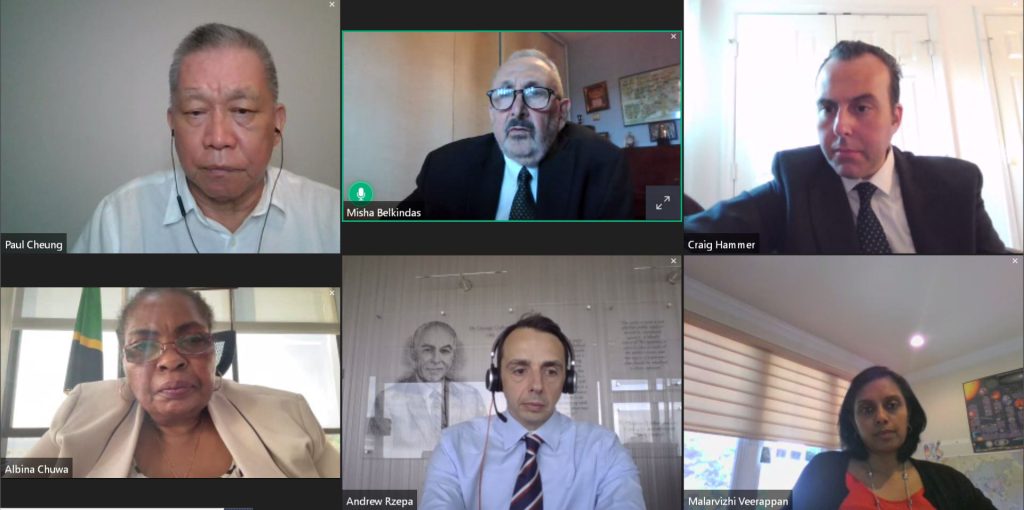
Watch the video recording: IAOS – World Bank Event “Building strong Integrated National Data Systems to transform people’s lives”
UN Statistical Commission 2022: Side Event “Ethics, trust, governance and use of data: Enhancing Official Statistics Capacity to address these issues” - 8 February 2022

This side event hosted by the IAOS at the UNSC 53rd Session on February 8, 2022 provided an opportunity to explore issues of ethics, trust, governance and use of data and reflect on the Association’s proposal to create a small reflection group to give more prominence and focus to these issues.
Speakers:
- Misha Belkindas, IAOS President
- Martine Durand, Retired OECD Chief Statistician, Member of the French Statistical Authority
- Jan Robert Suesser, Member of IAOS Executive Committee and Member of ISI Advisory Board on Ethics
- Walter Radermacher, Retired Director-General, Eurostat, President of Federation of European National Statistical Societies, Chair of ISI Advisory Board on Ethics
- Gemma Van Halderen, Member of IAOS Executive Committee and Focal Point for IAOS Young Statisticians Prize
Read the presentations from the side event below:
Watch the video recording: UNSC 2022 Side Event “Ethics, trust, governance and use of data: Enhancing Official Statistics Capacity to address these issues”
Writing manuscripts for Official Statistics journals: Guidelines for practitioners and researchers - 8-15 February 2022
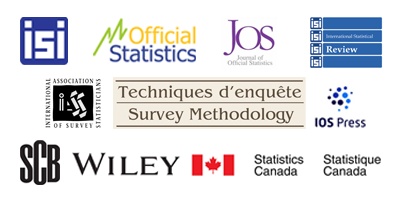
Location: Register for free
The workshop will be held via GoToWebinar in three separate sessions:
- Session 1: 8 February 2022, 3.00–5.00 PM (CET)
- Session 2: 10 February 2022, 3.00–5.00 PM (CET)
- Session 3: 15 February 2022, 3.00–5.00 PM (CET)
Under the auspices of the ISI, the Statistical Journal of the IAOS (IAOS), The Survey Statistician (IASS), Journal of Official Statistics (JOS, Statistics Sweden), Survey Methodology (SMJ, Statistics Canada), IOS Press and Wiley are organizing a workshop comprising three separate webinars of two hours each.
Presenters at the workshop are the Chief Editors (or former Chief Editors) of the journals involved, as well as experienced and successful authors and representatives from the publishers. The detailed programme can be found below.
Target group
The workshop is intended for Official Statisticians and academics (from all over the world) with interest in preparing a submission of a manuscript to a refereed international journal in the field of statistics. The workshop language will be English.
Requirements of the participants
Working knowledge of the English language.
Involved in the preparation or with an interest to prepare manuscripts for submission to a refereed international journal in the field of Official Statistics.
Access to internet to follow the webinars. (Windows, Mac)
Objective of the workshop
The objective of this workshop is to prepare Official Statisticians and researchers to draft and submit manuscripts to Official Statistics journals. The workshop focuses on manuscript drafting and structuring skills as well as on anticipating the knowledge level and expectations of the audiences and on organizing and preparing a manuscript for submission to a journal in the field of Official Statistics.
How to register
Participants are invited to register using the registration link. The workshop is offered free of charge.
Certificate of Attendance
After successful participation in the workshop, participants will be awarded with a Certificate of Attendance by the ISI. Successful participation is defined as having participated in at least 70% of the duration of each of the three webinars.
Workshop Programme
Session 1: 8 February 2022
3.00-5.00 PM (CET) Check your own timezone.
- A word of welcome by Stephen Penneck (President of the ISI)
- Introduction to the organization and content of the workshop — Pieter Everaers (SJIAOS)
- Why, how and for whom to draft a manuscript? — Steve Raywood (Wiley)
- The overall structure of a manuscript — Wesley Yung (Statistics Canada)
- Some practical examples of types of manuscripts — Denise Britz do Nascimento Silva (IBGE, Brazil)
- Closing of first session and introduction to exercises A and B — Pieter Everaers (SJIAOS)
Session 2: 10 February 2022
3.00-5.00 PM (CET) Check your own timezone.
- Recapitulation of Session 1 — Ingegerd Jansson (Statistics Sweden)
- Outcomes of exercise A — Pieter Everaers (SJIAOS)/Peter de Jong (IOS Press)
- Outcomes and reflection on exercise B — Wesley Yung (Statistics Canada)
- How to restrict to the necessary — Denise Britz do Nascimento Silva (IBGE, Brazil)
- Working efficiently in structuring and drafting — Steve MacFeely (WHO)
- Closing of the second session and introduction to exercise C — Ingegerd Jansson (Statistics Sweden)
Session 3: 15 February 2022
3.00-5.00 PM (CET) Check your own timezone.
- Recapitulation of the second session — Wesley Yung (Statistics Canada)
- Typical structure of a manuscript — Steve Raywood (Wiley)
- Submission, review and revision from the content perspective — Ingegerd Jansson (Statistics Sweden)/Pieter Everaers (SJIAOS)
- Submission, review and revision from the technical perspective — Kim Willems (IOS Press)/Steve Raywood (Wiley)
- Young Statisticians Awards — Gemma van Halderen (ABS, Australia)
- Closing of the third session and the workshop — Wesley Yung (Statistics Canada)/Pieter Everaers (SJIAOS)
Statistical linkage of multiple disparate data sources with an application to estimate COVID-19 vaccine hesitancy rates for small areas - 15 November 2021
Co-sponsored by the International Association for Official Statistics (IAOS) and ASA Washington Statistical Society, speakers are:
Partha Lahiri
Professor and Director, Joint Program in Survey Methodology
Professor, Department of Mathematics
University of Maryland, College Park
Abstract:
The greater accessibility of administrative and Big Data and advances in technology are now providing new opportunities for researchers to solve a wide range of problems that would not be possible using a single data source. However, these databases are often unstructured and are available in disparate forms, making data linkages quite challenging. There is, therefore, a growing need to develop innovative statistical data linkage tools to link such complex multiple data sets. In this talk, we will focus on one important application of statistical data linkage to estimate small area proportions. We first present our general small area estimation (SAE) methodology. We then apply the proposed methodology to estimate vaccine hesitancy rates for the US states and the District of Columbia (small areas). We use data from two different surveys — one probability survey representing the entire adult US population and the other a non-probability survey representing only active adult Facebook users — and Census Bureau estimates of adult population counts at granular levels along with data from an independent COVID-19 data reporting website. The proposed SAE methodology could potentially help public policymakers target geographical areas for vaccination, public health campaigns and vaccine distribution. This talk is based on collaborative research with Professor’s Lahiri doctoral student Soumojit Das.
About the speaker:
Partha Lahiri is a Professor in the Joint Program in Survey Methodology (JPSM) and in the Department of Mathematics at the University of Maryland, College. He is a Fellow of the American Statistical Association and the Institute of Mathematical Statistics and an elected member of the International Statistical Institute. Professor Lahiri is the recipient of the 2020 SAE award for his outstanding contribution to the research, application, and education of small area estimation (SAE).
The role of National Statistical Offices in society and why professional independence is its foundation - 29 June 2021
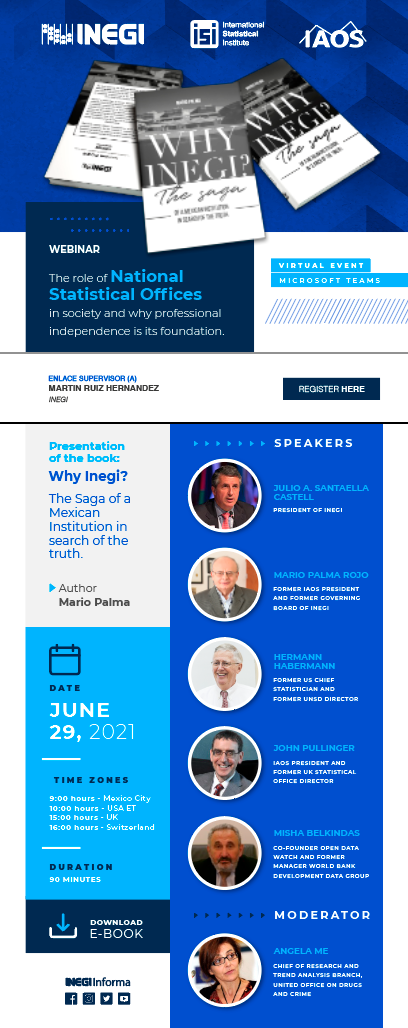
Hosted by INEGI, ISI and IAOS, speakers are:
- Julio Santaella Castell, President of INEGI
- Mario Palma Rojo, former IAOS President and former Governing Board of INEGI
- Hermann Habermann, former US Chief Statistician and UNSD Director
- John Pullinger, IAOS President and former UK National Statistician
- Misha Belkindas, founder of Open Data Watch and IAOS President-Elect
Moderator:
- Angela Me, Chief of Research and Trend Analysis Branch, UN Office on Drugs and Crime
This event will be hosted in Microsoft Teams and you can register to attend via this link.
Mario Palmer will also present his new book ‘Why INEGI? The saga of a Mexican institution in search of the truth‘.
Download a copy of Mario’s e-book via this link.
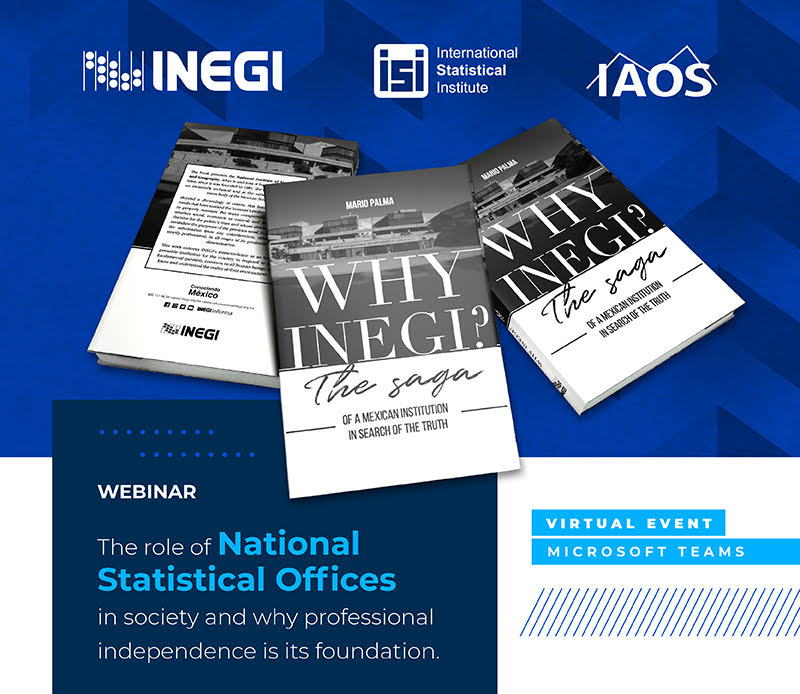
More on Misuse of Statistics: time to speak out - 22 February 2021
This event is a call to action at the national, regional and global level: where there is misuse of statistics it is time to speak out. The event will build on the webinar hosted by the International Association for Official Statistics (IAOS) on 6 October 2020.
The aim is to examine the issues raised from diverse perspectives and propose solutions to an issue that matters greatly to all members of the Statistical Commission and is relevant to many of the items on the agenda for the 52nd meeting. A number of papers on this topic will also be published in the Statistical Journal.
The webinar has taken place on 22nd February 2021. An open debate will also be live from the day of the event on www.officialstatistics.com.
You can read the papers:
IAOS and IASS Joint webinar to celebrate World Statistics Day: On the importance to Society of High Quality Public Statistics - 5 November
Speakers:
- Dr. Walter J. Radermacher, Eric Rancourt.
Watch the video recording: Joint IAOS-IASS Webinar to Celebrate World Statistics Day
Read the papers:
Eurostat and SCORUS: Regional and local statistics for more informed policy making - 26 - 27 October 2020
Speakers:
- L. Franconi, M. Mantuano, D. Ichim, Italian National Institute of Statistics. K. Loik, Statistics Estonia. V. Angelova, Statistics Bulgaria. J.Gaffuri, Eurostat. C. Ozguzel, OECD. A. Onnerfors, Eurostat. M. Diaz Ramirez, OECD. M. Kamphorst and J. Van der Valk, CBS.
You can view the presentations from the webinar here.
New World Order and Official Statistics in Nigeria - 22 October 2020
Speakers:
- Prof. O. E. Olubusoye, Dr Pieter Everaers, Dr Iyabode F. Oyenuga and Prof. D. A. Agunbiade
Watch the video recording New World Order and Official Statistics.
Read the papers:
Misuse of Statistics: Time to Speak Out - 6 October 2020
Speakers:
- Ed Humperson, Director General, Office for Statistics Regulation, UK with panellists Martine Durand, Pali Lehohla, Andreas Georgiou and Hernan Munoz
Watch the video recording Misuse of Statistics – Time to Speak Out.
You can also have a look at the presentations:
